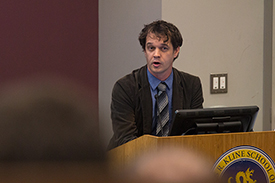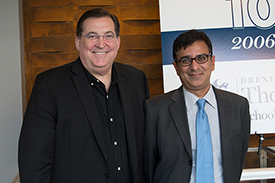The Drexel Law Review Symposium on Oct. 14 assembled some of the nation’s leading scholars and advocates in immigration law to explore laws passed in 1996 that sparked greater detentions and deportations of noncitizens and erected barriers to asylum.
“20 Years After the 1996 Immigration Laws: Revisiting an Experiment in Comprehensive Severity” explored the political and social climate that produced the Illegal Immigration Reform and Immigrant Responsibility Act and the Antiterrorism and Effective Death Penalty Act, assessed their impact and explored strategies for responding to the laws and addressing violations of human and constitutional rights that have resulted.
The laws aimed to remedy perceived abuse by asylum seekers, said Columbia Law School Professor T. Alexander Aleinikoff, who previously served as the United Nations deputy high commissioner for refugees and as executive associate commissioner for programs at the Immigration and Naturalization Service.
But the laws featured “stealth provisions” that were not in either the early House or Senate versions but were folded into the legislation, which was adopted as part of an omnibus budget vote, said New York University School of Law Professor Nancy Morawetz.
“There’s a temptation to think it was intentionally severe,” Morawetz said. “But the specifics were not what could fairly be called congressional intent.”
The laws also permitted secret evidence and made provision of "material support" to a terrorist organization as a basis for deportation, University of South Carolina School of Law Professor Wadie Said said, adding that support in the form of speech has also been criminalized.
Stanford Law School and Yale Law School Professor Lucas Guttentag, who founded and led the American Civil Liberties Union’s Immigrants’ Rights Project, discussed the stripping away of the federal judiciary's jurisdiction over administrative actions.
The laws’ expedited removal process deprives noncitizens of opportunities to apply for asylum unless they pass a screening process that effectively allows Border Patrol officers to act as judges, said Eleanor Acer, senior director of Human Rights First’s Refugee Protection program.
 U.S. Supreme Court decisions that have narrowly interpreted the criminal grounds of deportability have had a limited impact, University of Georgia School of Law Professor Jason Cade said.
U.S. Supreme Court decisions that have narrowly interpreted the criminal grounds of deportability have had a limited impact, University of Georgia School of Law Professor Jason Cade said.
“In the absence of executive or legislative change, we’re seeing the court throw a bucket on a raging fire,” Cade said.
The laws created a hybrid civil and criminal process in which the administrative or civil process of deportation is intertwined with criminal matters that can prompt removal from the U.S., University of Miami School of Law Professor Rebecca Sharpless said, explaining that the courts have struggled to define the circumstances under which it should defer to executive branch interpretations of matters involving hybrid statutes.
 In the keynote, America’s Voice Founder and Executive Director Frank Sharry traced the genesis of the 1996 laws amid a political climate that grew increasingly hostile to immigrants, forcing reform advocates to compromise on issues like mandatory detention and court stripping in order to defeat asylum restrictions and refugee caps.
In the keynote, America’s Voice Founder and Executive Director Frank Sharry traced the genesis of the 1996 laws amid a political climate that grew increasingly hostile to immigrants, forcing reform advocates to compromise on issues like mandatory detention and court stripping in order to defeat asylum restrictions and refugee caps.
“When this bill passed, I didn’t realize exactly what was to follow,” Sharry said, calling the outcome an “$18 billion enforcement machinery that’s a larger federal investment in the criminalization of immigrants than all of the other federal crime fighting programs combined.”
While President Obama pledged to make detention more civil and humane, the system has made only minor and modest improvements, reducing the number of families and individuals with mental health impairments in detention said Alison Parker, director of Human Rights Watch’s U.S. Program.
Grassroots activists are helping to address issues that contribute to the detention of noncitizens, including the school-to-prison pipeline, said Villanova University Charles Widger School of Law Professor Caitlin Berry.
 As a sanctuary city, Philadelphia is working to broaden rights for immigrants, said City Councilwoman Helen Gym, who introduced a bill to join other cities in demanding revisions to the 1996 immigration laws.
As a sanctuary city, Philadelphia is working to broaden rights for immigrants, said City Councilwoman Helen Gym, who introduced a bill to join other cities in demanding revisions to the 1996 immigration laws.
“Legal strategies to address what’s happening will ultimately falter if they’re not matched by organizing for justice,” Gym said. “People are going to demand change and they’re going to move it.”
Yale Law School Professor Michael Wishnie agreed, noting that state and local measures are being challenged and will continue to come under scrutiny as the Deferred Action for Parents of Americans and Deferred Action for Childhood Arrivals undergo implementation state by state.
University of Washington School of Law Professor Angélica Cházaro said Obama’s 2014 Executive Action on Immigration increased categories of misdemeanors that make up the majority of criminal convictions and significantly hiked the number of people who are “easy pickings” for detention and removal.
Reforms aimed at addressing mass criminal incarceration have yet to benefit the immigrant population, said University of California, Irvine School of Law Professor Annie Lai, noting that even pardons and expungements do not protect immigrants’ status.
Family law and other areas of law offer potential avenues for relief, Widener University Commonweatlh School of Law Professor Jill Family said, noting that the “best interest of the child” standard that’s missing from immigration matters could protect families on the brink of separation.
University of California, Irvine School of Law Professor Jennifer Chacón said the 1996 immigration and welfare reform laws were designed to create bright lines rules between citizens and everyone else, but have actually weakened the power of federal citizenship and given states and localities enforcement authority.
“Race, class and geography do more work in determining who will suffer more severe consequences,” Chacón said, urging activists and grassroots organizers to name the problems and solutions.
Though the laws have yielded difficult and traumatic circumstances, Drexel Kline School of Law Professor and symposium organizer Anil Kalhan said, the scholarly and advocacy communities have launched "a lot of inspiring creativity."